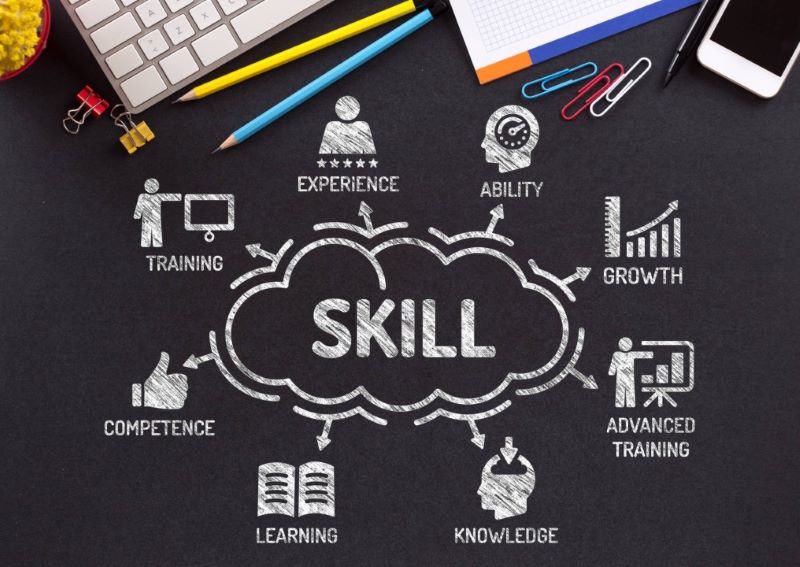
Skill training vs. higher education: what’s the best option?
Degree vs. skill is an interesting but important question with no definite answer
Prof Dr. Abdullah G Arijo
In our daily lives, whenever we encounter problems, we call a skilled person and our matter is solved. In the past, people didn’t always rely on formal degrees to navigate life. Instead, they often developed practical skills and experience through apprenticeships, family trades, and hands-on work. Formal education wasn’t as widely available as it is today, so people learned through practical means. Success and survival didn’t always require a degree. People developed various skills in crafts, agriculture, and other trades, passing them down from generation to generation. Proficiency in trade was highly valued, whether it was blacksmithing, farming, or carpentry, as it allowed individuals to contribute to their communities and earn a living.
There are quite a few ways of learning and earning such as community-based learning: Communities played a critical role in education as elders, mentors, and local experts shared knowledge with younger generations. Apprenticeships were common, and youngsters would work alongside skilled craftsmen, learning the trade firsthand.
The degrees have become more prevalent, but the survival and success are rooted in practical skills, community learning, and adaptability.
People adapted to their circumstances. If formal education was scarce or expensive, they found alternative ways to learn and survive. Self-study, reading, and practical experimentation were essential. Social mobility is also important. While formal degrees were not widespread, social mobility was still possible. Hard work, networking, and a strong work ethic allowed individuals to progress in their careers.
There were challenges also such as lack of formal education, limiting the opportunities. However, resourcefulness and determination often compensate for this. Access to information was limited compared to today’s digital age.

Degrees were once highly valued as they provided access to better jobs, social status, and economic stability. Nowadays, formal education is still important, but practical skills and experience are equally necessary. We often call skilled professionals to fix problems at home, making us question the value of obtaining a degree. There’s a debate about whether skill training should replace higher education. Here, we’ll take a closer look at both options and discuss which is best for learners.
Degree vs. skill is an interesting but important question with no definite answer. Some believe a degree is more valuable as it showcases higher education and credibility. Others argue skill is more important as it demonstrates practical ability and adaptability. Ultimately, the answer depends on context, industry, and individual.
Read: Skill training can make youth workplace-ready in digital era
Skills are practical and specific abilities, while degrees are formal recognitions of completing a course of study. Although degrees are broader and cover academic topics and theories, skills are more relevant and useful for the job at hand. For example, knowing how to code in Python is a skill that can be applied to various projects and tasks. However, having a degree in Computer Science may not provide the exact skillset required for a specific job.
Degrees are recognized, but skills are diverse. A degree follows a common curriculum and assessment, while a skill can be acquired in various ways. Degrees are easier to compare, but skills are subjective. Skills are more flexible and adaptable.
Skills are practical and specific abilities, while degrees are formal recognitions of completing a course of study
A degree is a qualification that is fixed and limited to a specific field and level. Skills are more responsive and relevant to the changing needs and demands of the market, while degrees are more rigid and outdated. For example, having a skill in digital marketing is a skill that can be applied to various platforms and strategies, while having a degree in Marketing is a degree that may not cover the latest trends and technologies in the field.
As you can see, there are pros and cons to both skills and degrees, and the best option may depend on your goals, interests, and opportunities. Some jobs may require a degree as a minimum requirement, while others may value a skill more than a degree. Some employers may look for a combination of skills and degrees, while others may focus on factors such as personality, attitude, and fit. Ultimately, the most important thing is to pursue what you are passionate about and to keep learning and growing as a professional and as a person.
Higher education can provide you with a recognized qualification that may open up more opportunities for employment, career advancement, or further study. It can also help you develop critical thinking, research, and communication skills that are valuable in many fields and contexts. However, higher education can also be expensive, time-consuming, and competitive. It may not guarantee you a job or a high income, especially in a rapidly changing and uncertain world. It may also not match your interests, passions, or learning style.
Historically, the primary purpose of pursuing higher degrees was to enhance knowledge, contribute to research, and improve the overall quality of education
Skill can help you demonstrate your practical and relevant abilities to potential employers, clients, or customers. It can also help you adapt to the changing needs and demands of the market and society. It can also allow you to pursue your passions, creativity, and innovation. However, skill can also be hard to measure, validate, or certify. It may not be recognized or valued by some employers, institutions, or industries. It may also require you to continuously update and improve your skills to stay competitive and relevant. In a country like Pakistan, where resources are often scarce, the allocation of significant funds toward Ph.D.
Historically, the primary purpose of pursuing higher degrees was to enhance knowledge, contribute to research, and improve the overall quality of education. However, over time, the focus has shifted. Many individuals now pursue advanced degrees with the primary goal of increasing their earning potential and securing better job opportunities.
 From an economic standpoint, investing in higher education can be seen as an investment in human capital. A well-educated workforce contributes to economic growth and innovation.
From an economic standpoint, investing in higher education can be seen as an investment in human capital. A well-educated workforce contributes to economic growth and innovation.
On the other hand, excessive spending on degrees that do not directly translate into practical skills or societal benefits can strain limited resources.
In countries like Pakistan, where brain drain is a concern, highly educated individuals often seek opportunities abroad. Striking a balance between encouraging education and ensuring practical outcomes is crucial. Policymakers must consider the return on investment for each educational program.
While higher education remains essential, it is essential to evaluate its impact and align it with the country’s needs and priorities.
Quality control mechanisms should be in place to maintain standards. Therefore recommendations regarding targeted funding may be the top one. Government should allocate resources strategically to fields that directly impact national development, innovation, and societal well-being. Emphasize practical skills alongside theoretical knowledge, encourage research that addresses local challenges, and contribute to sustainable development.
In summary, while higher education remains essential, it is essential to evaluate its impact and align it with the country’s needs and priorities. The pursuit of knowledge should not be compromised, but a pragmatic approach is necessary to maximize the benefits for both individuals and society.
Read: Merit or My Writ in Higher Education Institutions
The Pakistani government’s investment in Ph.D. degrees from technologically advanced countries like Europe, America, and Australia is indeed significant. However, there are varying perspectives on how these funds could be better utilized. Let’s explore both sides.
Investing in Foreign Ph.D. Degrees have some benefits, like global exposure, however, pursuing Ph.D. degrees abroad can be expensive, including tuition fees, living expenses, and travel costs. In summary, while degrees have become more prevalent, historical survival and success were often rooted in practical skills, community learning, and adaptability. The balance between formal education and hands-on expertise continues to shape our world.
_____________________________
 Prof. (R) Dr. Abdullah G. Arijo is Advisor and Visiting Professor, SBBUVAS, Sakrand, Pakistan. He is Ex-Chairman, Department of Parasitology, Sindh Agriculture University and Ex-Advisor Academics & P&D to Vice Chancellor SAU Tandojam
Prof. (R) Dr. Abdullah G. Arijo is Advisor and Visiting Professor, SBBUVAS, Sakrand, Pakistan. He is Ex-Chairman, Department of Parasitology, Sindh Agriculture University and Ex-Advisor Academics & P&D to Vice Chancellor SAU Tandojam